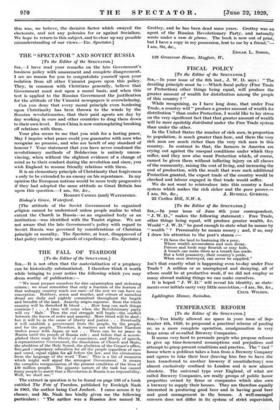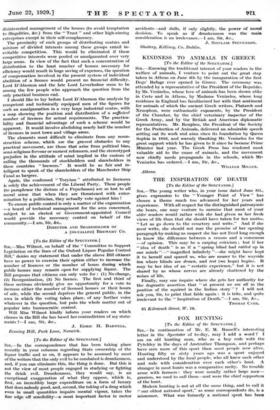TEMPERANCE REFORM
[To the Editor of the SPECTATOR.] _ Sin,—You kindly allowed me space in your issue of Sep. tember 4th, 1926, to propound a practical scheme of pooling or, as a more complete operation, amalgamation in very large areas of so-called Brewery Companies.
It seems very hard to persuade people who propose reforms to give up time-honoured assumptions and prejudices and attempt to grasp present conditions and practice. The " tied " house where a publican takes a loan from a Brewery Company and agrees to take their beer (leaving him free to have the loan transferred to another brewery if unsatisfactory) was almost exclusively confined ~to London and is now almost obsolete. The universal -type over England, of what are called Brewery Companies, are really groups of public house properties owned by firms or companies which also own a brewery to supply their houses. They are therefore equally interested in producing good beer and in having good beer and good management in the houses. A well-managed concern does not differ in its system of strict supervision, disinterested management of the houses (to avoid temptation to illegalities, &c.) from the " Trust " and other high-aiming enterprises except in their self-complacency.
The proximity of such groups of distributing centres and mixture of divided interests among these groups entail in- evitable competition. This would be eliminated if these competitive interests were pooled or amalgamated over very large areas. In view of the fact that such a concentration of distribution to the least number of houses necessary for efficiency would result in huge saving of expenses, the question of compensation involved in the present system of individual abolition of a licence would present no financial difficulty. Lord D'Abernon and the late Lord Leverhulme seem to be among the few people who approach the question from the only practical business end.
I should like to lay before Lord D'Abernon the analysis by competent and technically equipped men of the figures for such an amalgamation in a very large industrial centre, with a map showing the position and distribution of a sufficient number of licences for actual requirements. The practica- bility and financial advantage of such a scheme would be apparent. It would involve abolishing nearly half the number of licences in most town and village areas.
The elements most difficult to eliminate from any recon- struction scheme, which are the gravest obstacles to any practical movement, are those that arise from political bias, semi-religious fervour or earnest reformers, and the stereotyped prejudice in the attitude of mind implied in the custom of calling the thousands of stockholders and shareholders in these countries " brewers." It would be as fair and in- telligent to speak of the shareholders of the Manchester Ship Canal as bargees.
Again, the confirmed " Toryism " attributed to licensees is solely the achievement of the Liberal Party. These people (to paraphrase the dictum of a Frqnchman) are so lost to all moral sense that when they are threatened with exter- mination by a politician, they actually vote against him !
To ensure public control is only a matter of the organization —a board of technical management for the area concerned, subject to an elected or Government-appointed Council would •provide the necessary control on behalf of the community.—I am, Sir, &c.,
DIRECTOR AND SHAREHOLDER OF A (SO-CALLED) BREWERY CO.













































 Previous page
Previous page